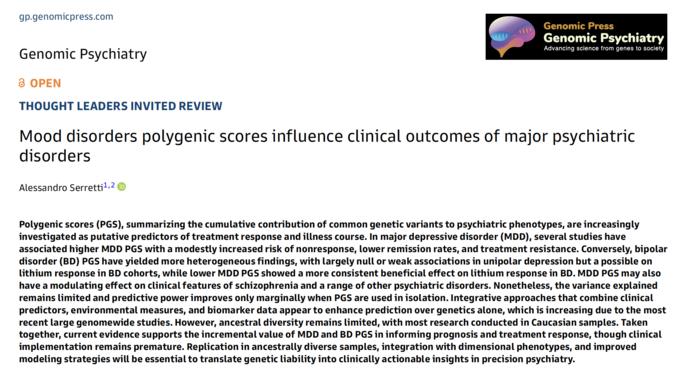In the rapidly evolving realm of psychiatric genetics, a landmark review published on June 24, 2025, in Genomic Psychiatry elucidates the intricate relationships between polygenic scores for mood disorders and clinical outcomes across major psychiatric conditions. Compiled by Professor Alessandro Serretti of Kore University of Enna, this comprehensive literature synthesis offers a nuanced perspective on how aggregated genetic risk influences treatment response in disorders such as major depressive disorder, bipolar disorder, and schizophrenia. As genomic data grows ever richer, the findings underscore both the promise and the current limitations of leveraging polygenic scores in psychiatric precision medicine.
Polygenic scores represent an innovative method of quantifying genetic susceptibility by aggregating the subtle effects of thousands of single nucleotide polymorphisms (SNPs) scattered throughout the genome. These cumulative scores encapsulate the heritable risk conferred by common variants identified in genome-wide association studies (GWAS). Professor Serretti’s review detailed data collected over more than a decade, from 2013 to 2025, demonstrating that elevated polygenic loading for major depressive disorder correlates with diminished treatment outcomes. Patients with higher depression polygenic risk exhibited greater odds of nonresponse or resistance to antidepressant pharmaceuticals, mood stabilizers, and antipsychotic medications, across diverse diagnostic categories including bipolar disorder and schizophrenia.
Such findings suggest a biologically grounded continuity in treatment resistance mechanisms influenced by genetic liability to depression, transcending traditional diagnostic boundaries. Importantly, these relationships were not confined to a single population or treatment context, affirming a genuine underlying genetic influence rather than statistical anomaly. However, despite robust associations, the effect sizes remain modest, with polygenic scores explaining less than 1% of the variance in clinical response, highlighting the pervasive challenge of "missing heritability" in psychiatric genomics.
The review also probed the polygenic architecture of bipolar disorder, uncovering a more complex interplay between genetic risk and clinical outcomes. Unlike depression, bipolar polygenic scores exhibited variable predictive patterns, sometimes associating with advantageous cognitive phenotypes such as elevated educational attainment and enhanced neurocognitive function. Conversely, these scores could predispose individuals towards psychosis or adverse symptom domains within bipolar disorder. This duality echoes the pleiotropic nature of psychiatric genetics, where identical variants can exert disparate effects dependent on environmental or developmental context.
Integration of gene-environment interactions emerged as a pivotal theme in the review. The synthesis revealed compelling evidence that individuals carrying higher polygenic risk for depression frequently experience increased exposure to life stressors and heightened sensitivity to environmental adversity. Conversely, bipolar genetic liability appeared to occasionally shield against certain negative outcomes or enhance resilience in some populations. These findings emphasize the dynamic reciprocity between genetic predisposition and environmental modulation in shaping clinical trajectories, offering an explanatory framework for heterogeneity observed among patients with similar genetic profiles.
Despite the growing sophistication of polygenic scoring methodologies, clinical implementation remains premature. The proportion of outcome variance explained by current polygenic markers is limited, often overshadowed by traditional clinical predictors. Professor Serretti cautions that these scores should be considered as ancillary predictive tools rather than standalone decision-making instruments in psychiatric practice. Furthermore, the research predominantly involves subjects of European ancestry, restraining the global applicability of polygenic risk prediction. Preliminary studies involving Asian cohorts have replicated directional effects but also underscore population-specific genomic architectures that may necessitate bespoke polygenic models.
In addressing these ancestral gaps, the future trajectory of psychiatric genetics research is moving towards greater inclusivity and statistical power. Larger, ethnically diverse GWAS will refine the accuracy and transferability of polygenic scores. Notably, the integration of polygenic data with clinical and environmental variables via machine learning algorithms represents a promising avenue to boost predictive performance. Some pioneering studies have reported improvements to 4-5% explained variance when leveraging multidimensional datasets, surpassing the limited scope of genetic data alone.
Additionally, the field is advancing towards harmonizing polygenic scores with neurophysiological biomarkers such as EEG measures, and interrogating epigenetic influences and rare genetic variants. These efforts seek to encapsulate the heterogeneity within psychiatric diagnoses and capture dynamic gene-environment interactions more comprehensively. Such multidimensional approaches have the potential to revolutionize treatment stratification and personalize therapeutic interventions in psychiatry.
The translational implications of these genetic discoveries are vast, yet the path toward clinical integration is complex and warrants methodical validation. Beyond statistical prediction, randomized controlled trials are essential to ascertain whether polygenic-informed strategies can meaningfully enhance treatment outcomes or cost-effectiveness. Meanwhile, the research alerts mental health practitioners to the possible utility of genetic risk profiles in identifying patients who may require intensified psychosocial support, environmental modifications, or closer symptom monitoring.
In summary, this authoritative review consolidates a growing body of evidence affirming that mood disorder polygenic scores exert consistent albeit modest effects on psychiatric treatment outcomes. While current predictive power is insufficient for direct clinical application, the ongoing evolution of research methodologies, coupled with expansion of ancestrally diverse data sets and integrative modeling, signals a transformative future for precision psychiatry. The findings articulate a compelling vision where genetic insights, interwoven with environmental and clinical information, will propel more tailored and effective interventions for complex psychiatric illnesses.
Subject of Research: People
Article Title: Mood disorders polygenic scores influence clinical outcomes of major psychiatric disorders
News Publication Date: 24-Jun-2025
Web References: http://dx.doi.org/10.61373/gp025i.0059
Image Credits: Alessandro Serretti
Keywords: polygenic scores, psychiatric genetics, major depressive disorder, bipolar disorder, schizophrenia, treatment resistance, gene-environment interaction, precision psychiatry, genome-wide association studies, psychiatric genomics, machine learning, neurophysiological biomarkers




